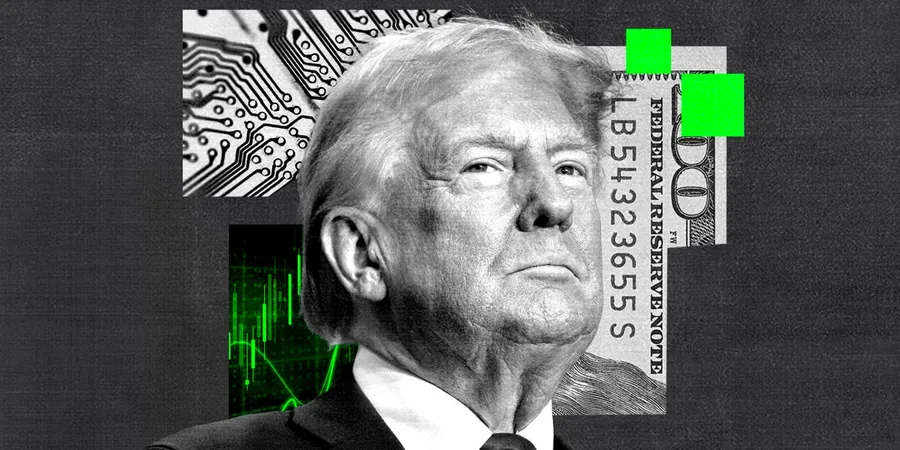
Stocks Suffer Worst Quarter in Three Years as Investors Abandon Hope Amid Trump's Tariff Strategies
2025-03-31
Author: Yan
The stock market is experiencing an unprecedented downturn, and the cause appears to be directly intertwined with President Donald Trump's unexpected approach to trade policy. What began as optimism following two consecutive years of double-digit gains has rapidly turned into disillusionment as the S&P 500 dipped 5% and the Nasdaq Composite plummeted by 10% over the recent quarter, marking the worst performance since 2022.
This sharp decline has left investors reeling. Trump's previously bullish rhetoric regarding trade negotiations has turned into uncertainty as his administration ramps up tariffs, signaling a shift from what many had hoped for in the face of inflationary pressures. Instead of partnering with the financial markets for mutual benefit, Trump’s actions have led many to believe he is now at odds with the very investors he once courted.
Adding to the market's anxiety, the White House's current stance suggests a disinterest in stock performance, which was not the case during his first term. Treasury Secretary Scott Bessent has stated that they do not view the current volatility as a concern, asserting Trump’s belief that tariffs might ultimately provide an economic boost, despite clear market signals to the contrary.
Investor sentiment has taken a pronounced hit, illustrated by the American Association of Individual Investors (AAII) survey which shows that 52% of respondents are bearish on market prospects for the next six months—an alarming trend that is double the historical average. CNN's Fear and Greed index has further plunged into "extreme fear" territory, a stark contrast to the "extreme greed" levels recorded just a year prior.
Furthermore, there has been a notable sell-off among fund managers, with a recent Bank of America survey indicating that portfolios are now 23% underweight in the U.S. market, a level not seen since last June. This flight from equities underscores the fear gripping the investment community as many scramble to reassess their strategies in light of the New York Federal Reserve's changing economic forecasts.
Major banks have responded to these shifts by pulling back their stock projections significantly. Goldman Sachs has made headlines for repeatedly cutting its S&P 500 target—from an initial estimate of 6,500 down to 6,200, and most recently suggesting a possible drop of up to 5% in the short term. They revised growth forecasts for S&P 500 earnings down to a mere 3% for 2025 from a previous projection of 7%, indicating a growing concern around sustained economic performance.
Further amplifying these cautionary signals, Citi has downgraded its stock outlook from "overweight" to "neutral," citing weak growth expectations driven by ongoing tariff debates. Similarly, HSBC and other financial institutions like RBC, UBS, and Barclays have all adjusted their year-end forecasts downward, with Barclays now one of the most conservative voices on Wall Street, reducing their target for the S&P 500 to 5,900.
As investors brace for what could be tumultuous months ahead, one thing remains clear: the uncertainty surrounding tariffs and Trump's administration’s economic approach may mean a prolonged struggle for U.S. equities moving forward. Investors are left wondering if there will be a reprieve or if this downturn is just the beginning of a more extended bearish trend.



 Brasil (PT)
Brasil (PT)
 Canada (EN)
Canada (EN)
 Chile (ES)
Chile (ES)
 Česko (CS)
Česko (CS)
 대한민국 (KO)
대한민국 (KO)
 España (ES)
España (ES)
 France (FR)
France (FR)
 Hong Kong (EN)
Hong Kong (EN)
 Italia (IT)
Italia (IT)
 日本 (JA)
日本 (JA)
 Magyarország (HU)
Magyarország (HU)
 Norge (NO)
Norge (NO)
 Polska (PL)
Polska (PL)
 Schweiz (DE)
Schweiz (DE)
 Singapore (EN)
Singapore (EN)
 Sverige (SV)
Sverige (SV)
 Suomi (FI)
Suomi (FI)
 Türkiye (TR)
Türkiye (TR)
 الإمارات العربية المتحدة (AR)
الإمارات العربية المتحدة (AR)